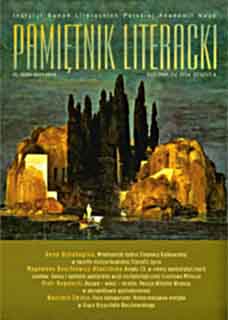Młodopolski debiut Eleonory Kalkowskiej w świetle nietzscheańskiej filozofii życia
Eleonora Kalkowska’s Modernist Debut in the Light of Nietzschean Philosophy of Life
Author(s): Anna DzhabaginaSubject(s): Literary Texts
Published by: Instytut Badań Literackich Polskiej Akademii Nauk
Keywords: Eleonora Kalkowska; Kalkowska's "Głód życia [Hunger for Life]"; Zofia Nałkowska; Nałkowska's "Narcyza"; Grażyna Borkowska; Magdalena Rembowska-Płuciennik; Nietzschean philosophy of life
Summary/Abstract: The author of the article carries out an analysis of a debut collection of Eleonora Kalkowska’s short stories and evokes the figure of the forgotten Polish-German woman writer. Nietzschean philosophy of life is a context for her modernist stage of creativity. Kalkowska’s “Głód życia (Hunger for Life)” published in 1904 not only contains many discernible tendencies of the epoch, noticed, inter alia, by Grażyna Borkowska, who calls Nietzsche modernist women writers’ favorite philosopher, but proves to be a predecessor piece for but Zofia Nałkowska’s creativity, the latter on the ground of women’s literature was attributed to the role. The author of the article analyses Kalkowska’s short stories in the context of such categories as affirmation of being, the will of power, and also in the context of problems related to her creativity’s moral aspects. Confronting it with Nałkowska’s modernist novel Narcyza, the author refers to the notion of Nietzschean “superwoman” described by Magdalena Rembowska-Płuciennik.
Journal: Pamiętnik Literacki. Czasopismo kwartalne poświęcone historii i krytyce literatury polskiej
- Issue Year: 2014
- Issue No: 4
- Page Range: 7-23
- Page Count: 7

